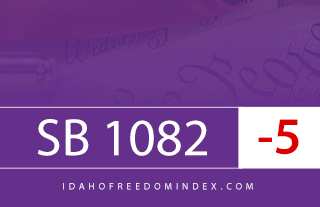


Bill description: This bill would create a new program to provide community care services to adults.
Rating: -5
Does it create, expand, or enlarge any agency, board, program, function, or activity of government? Conversely, does it eliminate or curtail the size or scope of government?
This would be an entirely new program for the state, “to improve the health of low-income Idahoans and to assist them in developing economic self-sufficiency.” The program is directed at Idaho residents who live under the poverty level with asthma, diabetes, heart disease, hypertension or obesity. The program would pay up to $600 for healthcare services at direct primary care centers, with subsidies for other services. The state would pay another $400 to providers who teach life skills, including helping individuals create and manage personal improvement plans. The state would reward courses such as budgeting, financial literacy, conflict resolution, goal setting, or cooking. (-1)
Does it transfer a function of the private sector to the government? Examples include government ownership or control of any providers of goods or services such as the Land Board's purchase of a self-storage facility, mandatory emissions testing, or pre-kindergarten. Conversely, does it eliminate a function of government or return a function of government to the private sector?
Private organizations across Idaho provide many of the services mentioned in this bill. Love INC in the Treasure Valley, for example, offers financial literacy courses, budget counseling, goal-setting courses, cooking courses, parenting courses and relational workshops. Love INC and other charities offer their services at no charge. They would not be as effective delivering those services competing with the state. (-1)
Does it increase government spending (for objectionable purposes) or debt? Conversely, does it decrease government spending or debt?
The program is expected to cost more than $600,000 for salaries and benefits for staff, a new office, and the many other administrative costs. The total cost, however, is expected to exceed $9.9 million in the first year and $15.6 million in the second. (-1)
Does it increase government redistribution of wealth? Examples include the use of tax policy or other incentives to reward specific interest groups, businesses, politicians, or government employees with special favors or perks; transfer payments; and hiring additional government employees. Conversely, does it decrease government redistribution of wealth?
This program expands Idaho’s welfare state. It transfers wealth from taxpayers to an estimated 15,000 individuals who would be eligible for benefits. Estimates provided with the bill show the sponsors expect individuals to receive the full $1,000 of coverage available to them. (-1)
Does it violate the principle of equal protection under the law? Examples include laws which discriminate or differentiate based on age, gender, or religion or which apply laws, regulations, rules, or penalties differently based on such characteristics. Conversely, does it restore or protect the principle of equal protection under the law?
Subsection 31-5905(e) of the bill makes specific mention of GoodRx, giving a privately run business paid through advertisements and referral fees an advantage over competing websites. (-1)


